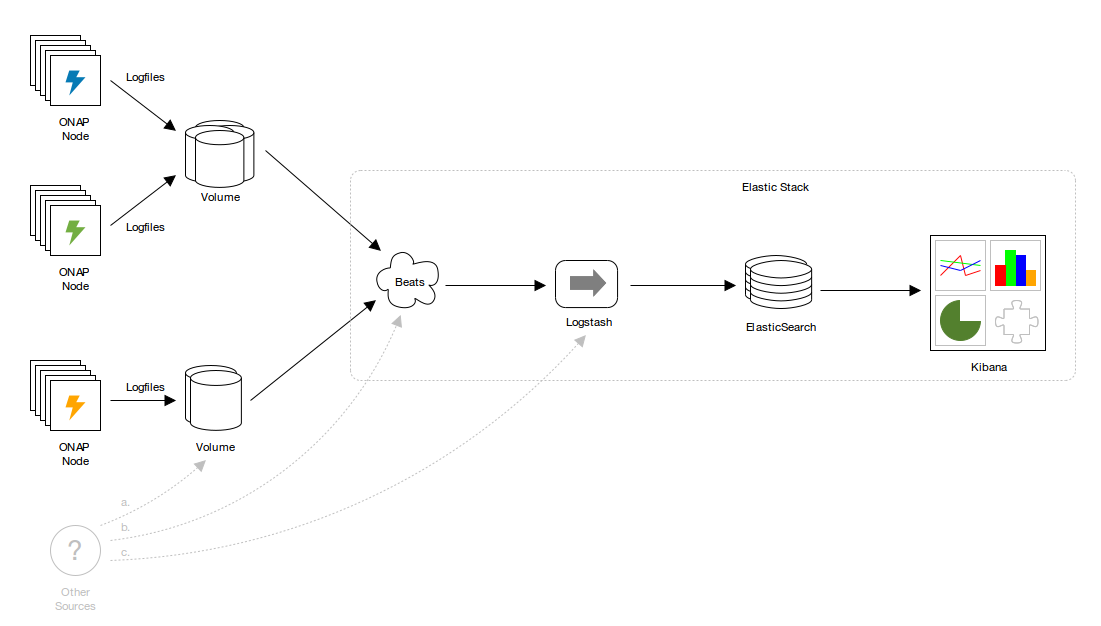...
| Deliverable Name | Deliverable Description |
|---|---|
| Revised logging guidelines | Updates to ONAP application logging guidelines.pdf, reflecting new conventions and requirements. |
| Logging provider configuration defaults | Regularized configuration locations, simplifying deployment and customization. |
| Logging provider output defaults | Regularized output locations, simplifying deployment and customization, and the shipping and indexing of logs. |
| Logging provider migration | Optional standardization of logger providers, including upgrading from EOL Log4j 1.X. |
| Updated logging provider configuration(s) | Updated, standardized configurations for all logging providers and ONAP components. |
| Filebeat configuration | Reference configuration for Elastic Stack Filebeat shipping. |
| Logstash configuration | Reference configuration for Elastic Stack Logstash indexing. |
| Elasticsearch configuration | Reference configuration for Elastic Stack Elasticsearch. |
| Kibana configuration | Reference configuration for Elastic Stack's Kibana Discover UI. |
| Elastic Stack deployment | Automated OOM deployment of an Elastic Stack reference configuration, providing ONAP with an OOTB analytics platform. |
| Documentation | Other documentation supporting analytics configuration. |
Sub-Components
List all sub-components part of this release.
Activities related to sub-component must be in sync with the overall release.
Sub-components are repositories are consolidate in a single centralized place. Edit the Release Components name for your project in the centralized page.
...
High level architecture diagram
At that stage within the ReleaseIn the reference configuration, the team Elastic Search pipeline is expected to provide more Architecture details describing how the functional modules are interacting.
TBD
Block and sequence diagrams showing relation within the project as well as relation with external components are expected.
configured to read files from persistent volumes. The impact on ONAP components is limited to logging provider configuration.
Anyone reading this section should have a good understanding of all the interacting modules.
API Incoming Dependencies
List the API this release is expecting from other releases.
Prior to Release Planning review, Team Leads must agreed on the date by which the API will be fully defined. The API Delivery date must not be later than the release API Freeze date.
Prior to the delivery date, it is a good practice to organize an API review with the API consumers.
...
None.
API Outgoing Dependencies
None.
Third Party Products Dependencies
| Name | Description | Version |
|---|---|---|
| Elastic Stack | Analytics platform comprising Filebeat, Logstash, Elasticsearch and Kibana. | 5.5+ |
| Kubernetes | Container orchestration system | Aligned with OOM. |
| Logback | Logging provider | Unchanged. |
| Log4j | Logging provider | Unchanged. |
API Outgoing Dependencies
API this release is delivering to other releases.
...
Third Party Products Dependencies
Third Party Products mean products that are mandatory to provide services for your components. Development of new functionality in third party product may or not be expected.
List the Third Party Products (OpenStack, ODL, RabbitMQ, ElasticSearch,Crystal Reports, ...).
| Name | Description | Version
|---|
In case there are specific dependencies (Centos 7 vs Ubuntu 16. Etc.) list them as well.
...
| Risk identified | Mitigation Plan | Contingency Plan |
|---|---|---|
| To fill out | To fill out | To fill out |
Resources
Fill out the Resources Committed to the Release centralized page.
Release Milestone
...
